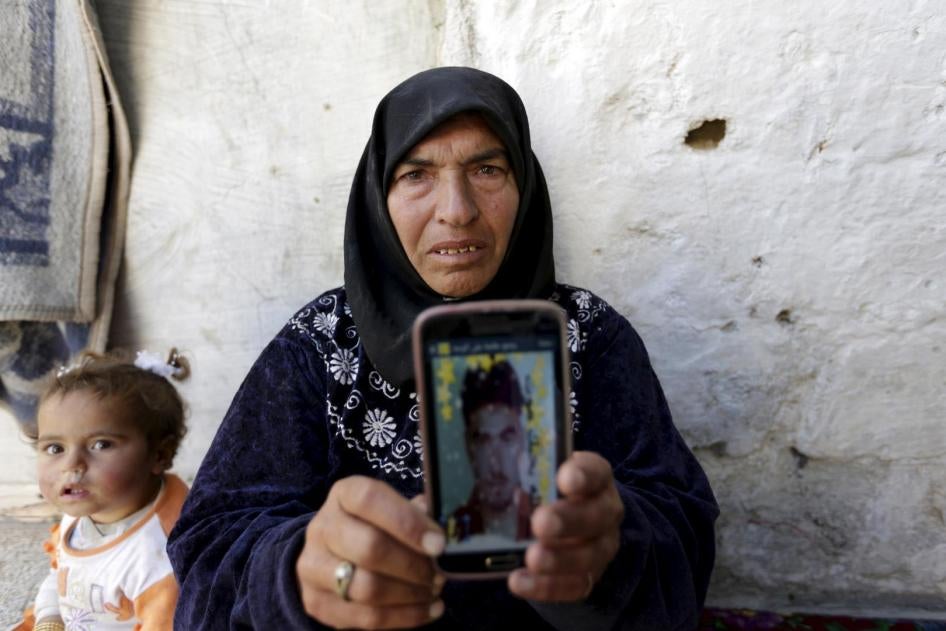(Beirut, August 30, 2017) – International backers of negotiations to end the conflict in Syria should ensure that any transitional process includes a robust independent body to investigate thousands of “disappeared,” Human Rights Watch said today. The United Nations designated August 30 as the International Day of the Victims of Enforced Disappearances to raise awareness about enforced disappearances around the world.
The UN Commission of Inquiry on Syria has determined that the use of enforced disappearance by the Syrian government is widespread, and may amount to a crime against humanity. An independent institution in charge of investigating the fate and whereabouts of the disappeared, as well as unidentified human remains and mass graves in Syria, should be created immediately, Human Rights Watch said. It should have a broad mandate to investigate, including by reviewing all official records and interviewing any official, and be backed with international political and material support.
“Syria will not be able to move forward if negotiations fail to adequately address the horrors of detention and disappearance,” said Sarah Leah Whitson, Middle East director at Human Rights Watch. “This should not be ignored. Without progress, each day that passes will likely see more of the disappeared tortured or executed.”
Even before the crisis began in 2011, Syrian authorities followed a policy of forcibly disappearing people for peaceful political opposition, critical reporting, and human rights activism. The use of enforced disappearances dramatically escalated since the uprising, and non-state armed groups have also engaged in abductions. Human Rights Watch has documented Syrian authorities’ systematic use of enforced disappearances, which frequently result in torture, death, and the absence of any information about the victim.
The exact number of disappeared in Syria cannot be determined because the overwhelming majority of detention facilities are off limits to outsiders. Those detained by government security services or many of the non-state armed groups in Syria are usually held incommunicado. The Syrian Network for Human Rights (SNHR) estimates that more than 65,000 people have been forcibly disappeared or abducted in Syria since 2011, the vast majority by government forces and pro-government militias.
UN Security Council Resolution 2139, adopted in February 2014, strongly condemned kidnappings, abductions, and forced disappearances in Syria, and demanded an immediate end to such practices and the release of all people arbitrarily detained. However, no concrete steps were taken to implement this aspect of the resolution and multiple rounds of political negotiations have failed to deliver any breakthrough.
Enforced disappearance is defined under international law as the arrest or detention of a person by state officials or their agents followed by a refusal to acknowledge the arrest or to reveal the person’s fate or whereabouts. Enforced disappearances violate a range of fundamental human rights protected under international law, including prohibitions against arbitrary arrest and detention; torture and other cruel, inhuman, or degrading treatment; and extrajudicial execution. Enforced disappearances also contravene the right to due process and fair trials.
Forced disappearances may inflict severe mental suffering on the families of the disappeared, who may go months or years without learning of their relatives’ fate. In their quest for information, families of the disappeared often face financial blackmail. For instance, in March 2012, government forces arrested Bassel Khartabil, a peaceful, free-speech advocate. In October 2015, Syrian authorities transferred Khartabil from `Adra prison, where his family could visit him, to an undisclosed location. On August 1, 2017, nearly two years after his disappearance, Khartabil’s wife learned that government forces had executed him.
International backers of the upcoming Astana and Geneva political processes should ensure that the issue of the detained and disappeared is thoroughly addressed in the negotiations, Human Rights Watch said.
Russia and Iran, the most prominent backers of the Syrian government, should press the government to immediately publish the names of all individuals who died in Syrian detention facilities, and to inform families of the deceased and return the bodies to their relatives. They should also press the government to provide information on the fate or whereabouts of all those forcibly disappeared, end the practice of enforced disappearance, and allow independent humanitarian agencies access to detention facilities.
Backers of non-state armed groups, including Turkey, Saudi Arabia, and the United States, should compel groups they support to reveal the fate of detainees in their custody and allow humanitarian agencies access to their detention facilities.
The UN mediator, Staffan de Mistura, should publicly address the reasons for lack of progress on Syria’s disappeared and strengthen efforts to address this devastating problem.
“The scale of forced disappearances in Syria means that the victims and their family members likely number in the hundreds of thousands,” Whitson said. “For any resolution to the conflict to be sustainable, the issue of the disappeared needs to be addressed in a manner that delivers both news of their fate and justice.”
|
News Release
Syria: Talks Should Address ‘Disappeared’
Create Independent Body to Investigate Missing Persons
Your tax deductible gift can help stop human rights violations and save lives around the world.
Region / Country
Most Viewed
-
May 24, 2016
Stifling Dissent

-
November 25, 2019
A Dirty Investment

-
June 3, 2025
“They’re Ruining People’s Lives”

-
January 25, 2024
“We’re Dying Here”

-
July 25, 2017
“I Want to Be Like Nature Made Me”





